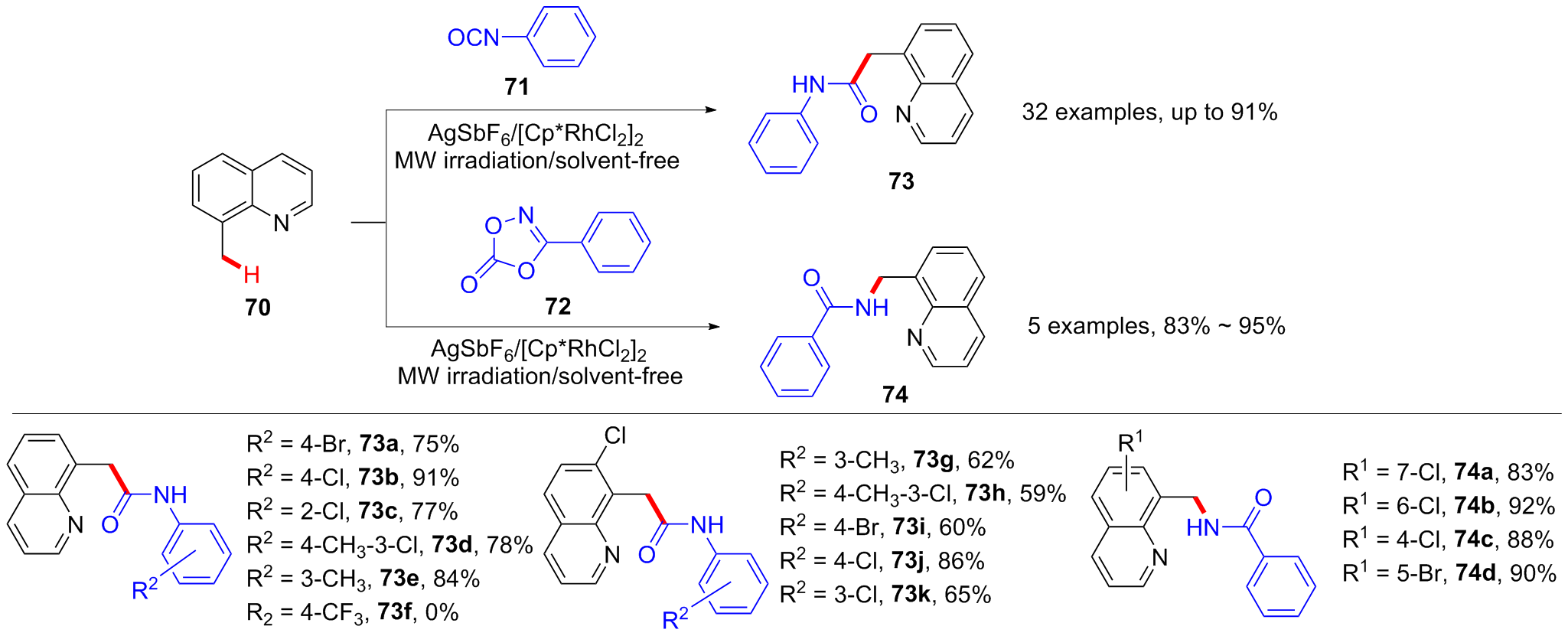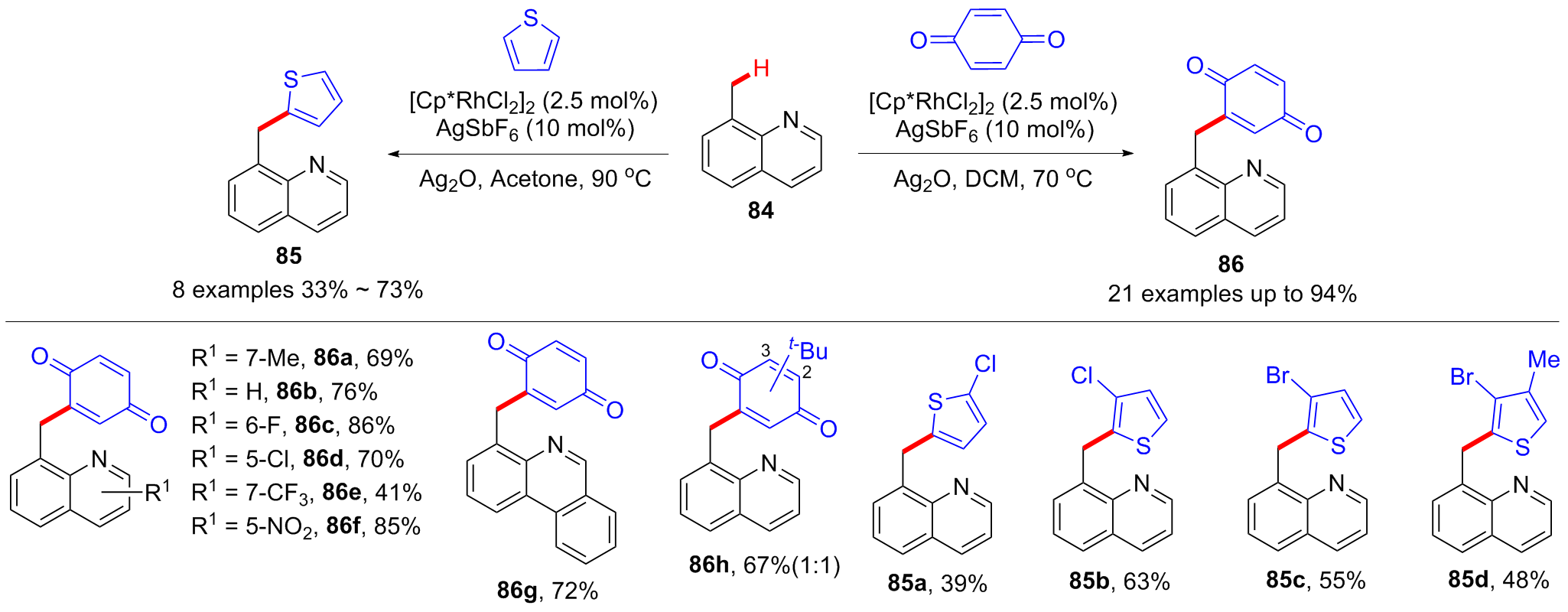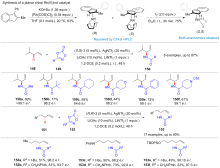有机化学 ›› 2022, Vol. 42 ›› Issue (2): 391-423.DOI: 10.6023/cjoc202108012 上一篇 下一篇
综述与进展
收稿日期:2021-08-10
修回日期:2021-09-22
发布日期:2022-02-24
通讯作者:
许红涛, 侯卫
基金资助:
Gaoxu Hana, Hongtao Xub( ), Wei Houa(
), Wei Houa( )
)
Received:2021-08-10
Revised:2021-09-22
Published:2022-02-24
Contact:
Hongtao Xu, Wei Hou
Supported by:文章分享

三价铑的外层电子为d6, 非常缺电子. 因此, Rh(III)催化C—H活化形成的C—Rh(III)键极性大,可以与多种包含极性键的试剂发生末端反应, 从而与钯等金属形成良好的交叉互补. 近年来, Rh(III)催化的C(sp2)—H键的官能团化反应取得了长足的发展, 在杂环骨架构建、药物修饰等方面应用越来越频繁. 惰性的C(sp3)—H键与C(sp2)—H键的活化机制类似,但是C(sp3)—H键的键能比C(sp2)—H键更强,并且没有易与金属中心发生轨道相互作用的π电子, 使该领域的探索和研究依然面临艰巨的挑战. 根据不同的反应类型进行分类, 系统地概括了Rh(III)催化C(sp3)—H键官能团化这一领域的研究进展.
韩高旭, 许红涛, 侯卫. 铑(III)催化的C(sp3)—H官能团化[J]. 有机化学, 2022, 42(2): 391-423.
Gaoxu Han, Hongtao Xu, Wei Hou. Rhodium(III) Catalyzed C(sp3)—H Functionalization[J]. Chinese Journal of Organic Chemistry, 2022, 42(2): 391-423.










| [1] |
Cho, S. H.; Kim, J. Y.; Kwak, J.; Chang, S. Chem. Soc. Rev. 2011, 40, 5068.
doi: 10.1039/c1cs15082k |
| [2] |
Yang, Y.; Lan, J.; You, J. Chem. Rev. 2017, 117, 8787.
doi: 10.1021/acs.chemrev.6b00567 |
| [3] |
Dyker, G. J. Am. Chem. Soc. 2006, 128, 5982.
|
| [4] |
Yamaguchi, J.; Yamaguchi, A. D.; Itami, K. Angew. Chem., nt. Ed. 2012, 51, 8960.
doi: 10.1002/anie.201201666 |
| [5] |
Gandeepan, P.; Muller, T.; Zell, D.; Cera, G.; Warratz, S.; Ackermann, L. Chem. Rev. 2019, 119, 2192.
doi: 10.1021/acs.chemrev.8b00507 |
| [6] |
Su, L.; Yu, Z.; Ren, P.; Luo, Z.; Hou, W.; Xu, H. Org. Biomol. Chem. 2018, 16, 7236.
doi: 10.1039/C8OB02071J |
| [7] |
Hou, W.; Xiong, H.; Bai, R. S.; Xiao, Z. Z.; Su, L.; Ruan, B. H.; Xu, H. Tetrahedron 2019, 75, 4005.
doi: 10.1016/j.tet.2019.06.021 |
| [8] |
Su, L.; Hou, W. Chin. J. Org. Chem. 2019, 39, 363. (in Chinese)
doi: 10.6023/cjoc201806021 |
|
( 苏琳, 侯卫, 有机化学, 2019, 39, 363.)
doi: 10.6023/cjoc201806021 |
|
| [9] |
Xiong, H.; Gu, Y.; Zhang, S.; Lu, F.; Ji, Q.; Liu, L.; Ma, P.; Yang, G.; Hou, W.; Xu, H. Chem. Commun. 2020, 56, 4692.
doi: 10.1039/D0CC01647K |
| [10] |
Zhang, X.; Bai, R.; Xiong, H.; Xu, H.; Hou, W. Bioorg. Med. Chem. Lett. 2020, 30, 126916.
doi: 10.1016/j.bmcl.2019.126916 |
| [11] |
Xu, H.; Gu, Y.; Zhang, S.; Xiong, H.; Ma, F.; Lu, F; Ji, Q.; Liu, L; Ma, P.; Hou, W.; Yang, G.; Lerner, R. A. Angew. Chem., Int. Ed. 2020, 59, 13273.
doi: 10.1002/anie.v59.32 |
| [12] |
Shan, B.; Miao, Q.; Wang, R.; Jia, G. H.; Zhao, H. Q. Catal. Commun. 2019, 128, 105701.
doi: 10.1016/j.catcom.2019.05.008 |
| [13] |
Jazzar, R.; Hitce, J.; Renaudat, A.; Sofack-Kreutzer, J.; Baudoin, O. Chem.-Eur. J. 2010, 16, 2654.
doi: 10.1002/chem.200902374 |
| [14] |
Godula, K.; Sames, D. Science 2006, 312, 67.
pmid: 16601184 |
| [15] |
Chen, H. Y.; Schlecht, S.; Semple, T. C.; Hartwig, J. F. Science 2000, 287, 1995.
pmid: 10720320 |
| [16] |
Chen, Z.; Rong, M. Y.; Nie, J.; Zhu, X. F.; Shi, B. F.; Ma, J. A. Chem. Soc. Rev. 2019, 48, 4921.
doi: 10.1039/C9CS00086K |
| [17] |
Rej, S.; Chatani, N. Angew. Chem., Int. Ed. 2019, 58, 8304.
doi: 10.1002/anie.v58.25 |
| [18] |
Li, H.; Li, B. J.; Shi, Z. J. Catal. Sci. Technol. 2011, 1, 191.
doi: 10.1039/c0cy00076k |
| [19] |
Dai, Y. Q.; Li, X. W.; Liu, B. X. Chin. J. Org. Chem. 2021, 41, 4476. (in Chinese)
doi: 10.6023/cjoc202106017 |
|
( 戴雨倩, 李兴伟, 刘丙贤, 有机化学, 2021, 41, 4476.)
doi: 10.6023/cjoc202106017 |
|
| [20] |
Dong, Z. Z.; Li, P. F.; Li, X. W.; Liu, B. X. Chin. J. Chem. 2021, 39, 2489.
doi: 10.1002/cjoc.v39.9 |
| [21] |
Wang, Z. T.; Zheng, Z. A.; Li, P. J.; Zhou, C. N.; Cai, S. J.; Xiao, B.; Wang, L. Chin. J. Chem. 2021, 39, 2823.
doi: 10.1002/cjoc.v39.10 |
| [22] |
Liu, B. X.; Yang, L. Y.; Li, P. F.; Wang, F.; Li, X. W. Org. Chem. Front. 2021, 8, 1085.
doi: 10.1039/D0QO01159B |
| [23] |
Song, G.; Li, X. W. Acc. Chem. Res. 2015, 48, 1007.
doi: 10.1021/acs.accounts.5b00077 |
| [24] |
Song, G.; Wang, F.; Li, X. W. Chem. Soc. Rev. 2012, 41, 3651.
doi: 10.1039/c2cs15281a |
| [25] |
Kuhl, N.; Schröder, N.; Glorius, F. Adv. Synth. Catal. 2014, 356, 1443.
doi: 10.1002/adsc.v356.7 |
| [26] |
Rakshit, S.; Patureau, F. W.; Glorius, F. J. Am. Chem. Soc. 2010, 132, 9585.
doi: 10.1021/ja104305s pmid: 20578748 |
| [27] |
Liu, B. X.; Zhou, T.; Li, B.; Xu, S. S.; Song, H. B.; Wang, B. Q. Angew. Chem., Int. Ed. 2014, 53, 4191.
doi: 10.1002/anie.201310711 |
| [28] |
Wang, N. C.; Li, R. H.; Li, L. B.; Xu, S. S.; Song, H. B.; Wang, B. Q. J. Org. Chem. 2014, 79, 5379.
doi: 10.1021/jo5008515 |
| [29] |
Mishra, A. A.; Subhedar, D.; Bhanage, B. M. Chem. Rec. 2019, 19, 1829.
doi: 10.1002/tcr.v19.9 |
| [30] |
Yang, X. L.; Shan, G.; Wang, L. G.; Rao, Y. Tetrahedron Lett. 2016, 57, 819.
doi: 10.1016/j.tetlet.2016.01.009 |
| [31] |
Yoshino, T.; Matsunaga, S. Adv. Organomet. Chem. 2017, 68, 197.
|
| [32] |
Yoshino, T.; Matsunaga, S. Asian J. Org. Chem. 2018, 7, 1193.
doi: 10.1002/ajoc.v7.7 |
| [33] |
Tsukano, C. Chem. Pharm. Bull. 2017, 65, 409.
doi: 10.1248/cpb.c16-00969 |
| [34] |
He, C.; Whitehurst, W. G.; Gaunt, M. J. Chem 2019, 5, 1.
doi: 10.1016/j.chempr.2018.12.021 |
| [35] |
Das, A.; Maji, B. Asian J. Chem. 2021, 16, 397.
doi: 10.1002/asia.v16.5 |
| [36] |
Zhao, K.; Yang, L.; Liu, J. H.; Xia, C. G. Chin. J. Org. Chem. 2018, 38, 2833. (in Chinese)
doi: 10.6023/cjoc201805028 |
|
( 赵康, 杨磊, 刘建华, 夏春谷, 有机化学, 2018, 38, 2833.)
doi: 10.6023/cjoc201805028 |
|
| [37] |
Zhan, B. B.; Jiang, M. X.; Shi, B. F. Chem. Commun. 2020, 56, 13950.
doi: 10.1039/D0CC06133F |
| [38] |
Alexander, U.; Manuel, V. G. Synlett 2018, 29, 1937.
doi: 10.1055/s-0037-1610150 |
| [39] |
Baudoin, O. Acc. Chem. Res. 2017, 50, 1114.
doi: 10.1021/acs.accounts.7b00099 |
| [40] |
Dastbaravardeh, N.; Christakakou, M.; Haider, M.; Schnürch, M. Synthesis 2015, 45, 1421.
doi: 10.1055/s-00000084 |
| [41] |
Liu, Y.; You, T.; Wang, H. X.; Tang, Z.; Zhou, C. Y.; Che, C. M. Chem. Soc. Rev. 2020, 49, 5310.
doi: 10.1039/D0CS00340A |
| [42] |
Gonnard, L.; Guérinot, A.; Cossy, J. Tetrahedron 2019, 75, 145.
doi: 10.1016/j.tet.2018.11.034 |
| [43] |
Hou, W.; Yang, Y.; Wu, Y.; Feng, H.; Li, Y.; Zhou, B. Chem. Commun. 2016, 52, 9672.
doi: 10.1039/C6CC03846H |
| [44] |
Stevens, R. V. In The Total Synthesis of Natural Products, Ed.: Apsimon, J., Wiley, New York, 1977, 3, 489.
|
| [45] |
Tang, Y.; Chen, K. Dyes Pigm 1994, 26, 159.
doi: 10.1016/0143-7208(94)80032-4 |
| [46] |
Sauer, M.; Han, K. T.; Muller, R.; Nord, S.; Schulz, A.; Seeger, S.; Wolfrum, J.; Arden-Jacob, J.; Deltau, G.; Marx, N. J.; Zander, C.; Drexhage, K. H. J. Fluoresc. 1995, 5, 247.
doi: 10.1007/BF00723896 pmid: 24226792 |
| [47] |
Vejdelek, Z.; Protiva, M. Collect. Czech. Chem. Commun. 1990, 55, 1290.
doi: 10.1135/cccc19901290 |
| [48] |
Han, S.; Park, J.; Kim, S.; Lee, S. H.; Sharma, S.; Mishra, N. K.; Jung, Y. H.; Kim, I. S. Org. Lett. 2016, 18, 4666.
doi: 10.1021/acs.orglett.6b02295 |
| [49] |
Kim, S.; Han, S.; Park, J.; Sharma, S.; Mishra, N. K.; Oh, H.; Kwak, J. H.; Kim, I. S. Chem. Commun. 2017, 53, 3006.
doi: 10.1039/C6CC09830D |
| [50] |
Liu, B. X.; Hu, P. J.; Zhou, X. K.; Bai, D. C.; Chang, J. B.; Li, X. W. Org. Lett. 2017, 19, 2086.
doi: 10.1021/acs.orglett.7b00690 |
| [51] |
Kumar, R.; Parmar, D.; Gupta, S. S.; Sharma, U. J. Org. Chem. 2020, 85, 1181.
doi: 10.1021/acs.joc.9b03257 |
| [52] |
Huang, L. T.; Fukagawa, S.; Kojima, M.; Yoshino, T.; Matsunaga, S. Org. Lett. 2020, 22, 8256.
doi: 10.1021/acs.orglett.0c02872 |
| [53] |
Kumar, R.; Sharma, R.; Kumar, R.; Sharma, U. Org. Lett. 2020, 22, 305.
doi: 10.1021/acs.orglett.9b04331 |
| [54] |
Wasa, M.; Engle, K. M.; Yu, J. Q. Isr. J. Chem. 2010, 50, 605.
doi: 10.1002/ijch.v50.5/6 |
| [55] |
Baudoin, O. Chem. Soc. Rev. 2011, 40, 4902.
doi: 10.1039/c1cs15058h |
| [56] |
Wang, X.; Yu, D. G.; Glorius, F. Angew. Chem., Int. Ed. 2015, 54, 10280.
doi: 10.1002/anie.201503888 |
| [57] |
Beesley, R. M.; Ingold, C. K.; Thorpe, J. F. J. Chem. Soc. Trans. 1915, 107, 1080.
doi: 10.1039/CT9150701080 |
| [58] |
Jung, M. E.; Piizzi, G. Chem. Rev. 2005, 105, 1735.
doi: 10.1021/cr940337h |
| [59] |
Kumar, R.; Parmar, D.; Gupta, S. S.; Chandra, D.; Dhiman, A. K.; Sharma, U. Chem.-Eur. J. 2020, 26, 4396.
doi: 10.1002/chem.v26.19 |
| [60] |
Yuan, C. C.; Tu, G. L.; Zhao, Y. S. Org. Lett. 2017, 19, 356.
doi: 10.1021/acs.orglett.6b03522 |
| [61] |
Knecht, T.; Pinkert, T.; Dalton, T.; Lerchen, A.; Glorius, F. ACS Catal. 2018, 9, 1253.
doi: 10.1021/acscatal.8b04677 |
| [62] |
Lerchen, A.; Knecht, T.; Koy, M.; Ernst, J. B.; Bergander, K.; Daniliuc, C. G.; Glorius, F. Angew. Chem., Int. Ed. 2018, 57, 15248.
doi: 10.1002/anie.v57.46 |
| [63] |
Ghosh, B.; Samanta, R. Chem. Commun. 2019, 55, 6886.
doi: 10.1039/C9CC02391G |
| [64] |
Sharmoukh, W.; Ko, K. C.; Noh, C.; Lee, J. Y.; Son, S. U. J. Org. Chem. 2010, 75, 6708.
doi: 10.1021/jo101350k pmid: 20828180 |
| [65] |
Yus, M.; González-Gómez, J. C.; Foubelo, F. Chem. Rev. 2013, 113, 5595.
doi: 10.1021/cr400008h |
| [66] |
Yu, S. J.; Li, Y. Z.; Kong, L. H.; Zhou, X. K.; Tang, G. D.; Lan, Y.; Li, X. W. ACS Catal. 2016, 6, 7744.
doi: 10.1021/acscatal.6b02668 |
| [67] |
Burke, J. P.; Bian, Z.; Shaw, S.; Zhao, B.; Goodwin, C. M.; Belmar, J.; Browning, C. F.; Vigil, D.; Friberg, A.; Camper, D. V.; Rossanese, O. W.; Lee, T.; Olejniczak, E. T.; Fesik, S. W. J. Med. Chem. 2015, 58, 3794.
doi: 10.1021/jm501984f |
| [68] |
Kong, L. H.; Zhou, X. K.; Xu, Y. W.; Li, X. W. Org. Lett. 2017, 19, 3644.
doi: 10.1021/acs.orglett.7b01650 |
| [69] |
Zhao, H.; Zhou, X.; Li, B.; Liu, X.; Guo, N.; Lu, Z.; Wang, S. J. Org. Chem. 2018, 83, 4153.
doi: 10.1021/acs.joc.8b00086 |
| [70] |
Zhu, Y. Q.; He, J. L.; Niu, Y. X.; Han, T. F.; Zhu, K. ChemistrySelect 2019, 4, 576.
doi: 10.1002/slct.v4.2 |
| [71] |
Li, T.; Liu, C.; Wu, S.; Chen, C.; Zhu, B. Org. Biomol. Chem. 2019, 17, 7679.
doi: 10.1039/C9OB01531K |
| [72] |
Kong, L. H.; Liu, B. X.; Zhou, X. K.; Wang, F.; Li, X. W. Chem. Commun. 2017, 53, 10326.
doi: 10.1039/C7CC06048C |
| [73] |
Shan, B. D.; Kang, B. T.; Song, M. Y.; Wang, R.; Chen, G. Z.; Li, C. C.; Zhao, H. Q. Adv. Synth. Catal. 2020, 362, 2541.
doi: 10.1002/adsc.v362.12 |
| [74] |
Jiang, Y. Q.; Li, P. F.; Zhao, J.; Liu, B. X.; Li, X. W. Org. Lett. 2020, 22, 7475.
doi: 10.1021/acs.orglett.0c02618 |
| [75] |
Hili, R.; Yudin, A. K. Nat. Chem. Biol. 2006, 2, 284.
doi: 10.1038/nchembio0606-284 |
| [76] |
Sánchez, C.; Méndez, C.; Salas, J. A. Nat. Prod. Rep. 2006, 23, 1007.
pmid: 17119643 |
| [77] |
Kim, J.; Movassaghi, M. Acc. Chem. Res. 2015, 48, 1159.
doi: 10.1021/ar500454v |
| [78] |
Turkmen, Y. E.; Aggarwal, V. K. Science 2014, 343, 33.
doi: 10.1126/science.1248166 |
| [79] |
Grabowski, K.; Schneider, G. Curr. Chem. Biol. 2007, 1, 115.
|
| [80] |
Wang, J. L.; Zheng, G. F.; Li, X. W. Chem. Commun. 2020, 56, 7809.
doi: 10.1039/D0CC00952K |
| [81] |
Hu, X. H.; Yang, X. F.; Loh, T. P. ACS Catal. 2016, 6, 5930.
doi: 10.1021/acscatal.6b02015 |
| [82] |
Yu, S.; Tang, G.; Li, Y.; Zhou, X.; Lan, Y.; Li, X. W. Angew. Chem., Int. Ed. 2016, 55, 8696.
doi: 10.1002/anie.201602224 |
| [83] |
Jeong, T.; Mishra, N. K.; Dey, P.; Oh, H.; Han, S.; Lee, S. H.; Kim, H. S.; Park, J.; Kim, I. S. Chem. Commun. 2017, 53, 11197.
doi: 10.1039/C7CC06670H |
| [84] |
Huang, X. L.; Wang, Y.; Lan, J. B.; You, J. S. Angew. Chem., Int. Ed. 2015, 54, 9404.
doi: 10.1002/anie.201504507 |
| [85] |
Burman, J. S.; Blakey, S. B. Angew. Chem., Int. Ed. 2017, 56, 13666.
doi: 10.1002/anie.v56.44 |
| [86] |
Wang, Y. W.; Liu, H. X.; Li, B.; Wang, B. Q. Adv. Synth. Catal. 2018, 361, 1564.
doi: 10.1002/adsc.v361.7 |
| [87] |
Shi, H.; Dixon, D. J. Chem. Sci. 2019, 10, 3733.
doi: 10.1039/C8SC05225E |
| [88] |
Burman, J. S.; Harris, R.; Farr, C.; Bacsa, J.; Blakey, S. B. ACS Catal. 2019, 9. 5474.
doi: 10.1021/acscatal.9b01338 |
| [89] |
Wang, H.; Tang, G. D.; Li, X. W. Angew. Chem., Int. Ed. 2015, 54, 13049.
doi: 10.1002/anie.v54.44 |
| [90] |
Fukagawa, S.; Kojima, M.; Yoshino, T.; Matsunaga, S. Angew. Chem., Int. Ed. 2019, 58, 18154.
doi: 10.1002/anie.v58.50 |
| [91] |
Farr, C. M. B.; Kazerouni, A. M.; Park, B.; Poff, C. D.; Won, J.; Sharp, K. R.; Baik, M. H.; Blakey, S. B. J. Am. Chem. Soc. 2020, 142, 13996.
doi: 10.1021/jacs.0c07305 |
| [92] |
Cochet, T.; Bellosta, V.; Roche, D.; Ortholand, J. Y.; Greiner, A.; Cossy, J. Chem. Commun. 2012, 48, 10745.
doi: 10.1039/c2cc36067e |
| [93] |
Tan, X.; Liu, B.; Li, X.; Li, B.; Xu, S.; Song, H.; Wang, B. J. Am. Chem. Soc. 2012, 134, 16163.
doi: 10.1021/ja3075242 |
| [94] |
Archambeau, A.; Rovis, T. Angew. Chem., Int. Ed. 2015, 54, 13337.
doi: 10.1002/anie.v54.45 |
| [95] |
Chan, C. M.; Zhou, Z. Y.; Yu, W. Y. Adv. Synth. Catal. 2016, 358, 4067.
doi: 10.1002/adsc.201600900 |
| [96] |
Sun, J. Q.; Wang, K.; Wang, P. Y.; Zheng, G. F.; Li, X. W. Org. Lett. 2019, 21, 4662.
doi: 10.1021/acs.orglett.9b01553 |
| [97] |
Zhou, B.; Chen, Z.; Yang, Y.; Ai, W.; Tang, H.; Wu, Y.; Zhu, W.; Li, Y. Angew. Chem., Int. Ed. 2015, 54, 12121.
doi: 10.1002/anie.201505302 |
| [98] |
Audic, B.; Cramer, N. Org. Lett. 2020, 22, 5030.
doi: 10.1021/acs.orglett.0c01606 |
| [99] |
Kondo, Y.; García-Cuadrado, D.; Hartwig, J. F.; Boaen, N. K.; Wagner, N. L.; Hillmyer, M. A. J. Am. Chem. Soc. 2002, 124, 1164.
doi: 10.1021/ja016763j |
| [100] |
Bae, C.; Hartwig, J. F.; Boaen Harris, N. K.; Long, R. O.; Anderson, K. S.; Hillmyer, M. A. J. Am. Chem. Soc. 2005, 127, 767.
doi: 10.1021/ja044440s |
| [101] |
Maity, S.; Karmakar, U.; Samanta, R. Chem. Commun. 2017, 53, 12197.
doi: 10.1039/C7CC07086A |
| [102] |
Nelson, T. A. F.; Blakey S. B. Angew. Chem., Int. Ed. 2018, 57, 14911.
doi: 10.1002/anie.v57.45 |
| [103] |
Chen, Y. K.; Kang, Y. S.; Xu, H. J.; Zhang, P.; Zhao, J.; Li, T.; Sun, W. Y.; Lu, Y. Org. Lett. 2020, 22, 5390.
doi: 10.1021/acs.orglett.0c01715 |
| [104] |
Della-Felice, F.; Zanini, M.; Jie, X.; Tan, E.; Echavarren, A. M. Angew. Chem., Int. Ed. 2021, 60, 5693.
doi: 10.1002/anie.v60.11 |
| [1] | 刘杰, 韩峰, 李双艳, 陈天煜, 陈建辉, 徐清. 无过渡金属参与甲基杂环化合物与醇的选择性有氧烯基化反应[J]. 有机化学, 2024, 44(2): 573-583. |
| [2] | 高宝昌, 石雨, 田媛, 张治国, 张婧如, 孙宇峰, 毛国梁, 戴凌燕. 4-甲基-2-氧代-6-芳氨基-二氢-吡喃-3-腈衍生物的合成[J]. 有机化学, 2024, 44(2): 644-649. |
| [3] | 黄志友, 杨平, 何波, 欧文霞, 袁思雨. 吗啉磺酰胺化合物的设计、合成及其抑制大豆萌芽活性的研究[J]. 有机化学, 2024, 44(1): 309-315. |
| [4] | 樊思捷, 董武恒, 梁彩云, 王贵超, 袁瑶, 尹作栋, 张兆国. 可见光诱导的自由基环化反应构建4-芳基-1,2-二氢萘类化合物[J]. 有机化学, 2023, 43(9): 3277-3286. |
| [5] | 唐菁, 罗文坤, 周俊. 氮杂螺[4.5]三烯酮衍生物的合成研究进展[J]. 有机化学, 2023, 43(9): 3006-3034. |
| [6] | 宋晓, 卿晶, 黎君, 贾雪雷, 吴福松, 黄均荣, 金剑, 游恒志. 铜催化格氏试剂的不对称烯丙基烷基化连续流反应[J]. 有机化学, 2023, 43(9): 3174-3179. |
| [7] | 贝文峰, 潘健, 冉冬梅, 刘伊琳, 杨震, 冯若昆. 基于钴催化吲哚酰胺与二炔和单炔的[4+2]环化反应合成γ-咔啉酮[J]. 有机化学, 2023, 43(9): 3226-3238. |
| [8] | 程春霞, 吴露平, 沙风, 伍新燕. 手性叔膦-酰胺不对称催化香豆素与Morita-Baylis-Hillman碳酸酯之间的插烯烯丙基烷基化反应[J]. 有机化学, 2023, 43(9): 3188-3195. |
| [9] | 鄢伯钰, 吴阶良, 邓金飞, 陈丹, 叶秀深, 姚秋丽. 光诱导醇的直接脱羟基衍生化研究进展[J]. 有机化学, 2023, 43(9): 3055-3066. |
| [10] | 席敏, 段超, 迟捷, 付甜, 苏小龙, 王宏社. 腐殖酸作用下Strecker反应快速高效合成α-氨基腈[J]. 有机化学, 2023, 43(9): 3312-3318. |
| [11] | 吴文倩, 陈春霞, 彭进松, 李占宇. 羰基α-位胺化反应研究进展[J]. 有机化学, 2023, 43(8): 2743-2763. |
| [12] | 丁俊, 史啸坤, 郝宇, 白贺元, 张书宇. 银催化的β,γ-不饱和酰胺的不对称γ-胺化反应[J]. 有机化学, 2023, 43(8): 2946-2952. |
| [13] | 冯莹珂, 王贺, 崔梦行, 孙然, 王欣, 陈阳, 李蕾. 可见光诱导的新型官能化芳基异腈化合物的二氟烷基化环化反应[J]. 有机化学, 2023, 43(8): 2913-2925. |
| [14] | 张素珍, 张文文, 杨慧, 顾庆, 游书力. 铑催化2-烯基苯酚与炔烃的对映体选择性螺环化反应[J]. 有机化学, 2023, 43(8): 2926-2933. |
| [15] | 黄芬, 罗维纬, 周俊. 基于C—H键断裂的多氯烷基化反应研究进展[J]. 有机化学, 2023, 43(7): 2368-2390. |
| 阅读次数 | ||||||
|
全文 |
|
|||||
|
摘要 |
|
|||||